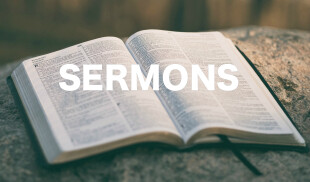GOD
God is the Creator and Ruler of the universe. He has eternally existed in three personalities: the Father, the Son and the Holy Spirit. These three are co-equal and one God.
Genesis 1:1, 26, 27; 3:27; Psalm 90:2; Matthew 28:19; 1 Peter 1:2; 2 Corinthians 13:14
Eternity
Man was created to exist forever. He will either exist eternally separated from God by sin or in union with God through His forgiveness and salvation. To be eternally separated from God is Hell. Heaven and Hell are places of eternal existence.
John 3:16: John 2:25; John 5:11-13: Romans 6:23; Revelation 20:15; Matthew 1:8; Matthew 2:44, 46
Salvation
Salvation is a gift from God to man. Man can never make up for his sin by self-improvement or good works. Only by trusting in Jesus Christ as God's offer of forgiveness can man be saved from sin's penalty. Eternal life begins the moment one receives Jesus Christ into his life by faith.
Romans 6:23, Ephesians 2:8,9; John 16:6, 1:12; Titus 3:5; Galatians 3:26; Romans 5:1
The Holy Spirit
The Holy Spirit is equal with the Father and the Son as God. He is present in the world to make men aware of their need of Jesus Christ. He also lives in every Christian from the moment of salvation. He provides the Christians with power for living, understanding spiritual truth, and guidance in doing what is right. The Christian seeks to live under His control daily.
2 Corinthians 3:17; John 16:7-13; 14:16, 17; Acts 1:8, 1 Corinthians 2:12; 3:16; Ephesians 1:13; Galatians 5:25; Ephesians 5:1
The Church
A New Testament church of the Lord Jesus Christ is a local body of baptized believers who are associated by covenant in the faith and fellowship of the gospel, observing the two ordinances of Christ, (believer's baptism and the Lord's Supper) committed to His teachings, exercising the gifts, rights and privileges invested in them by His word, and seeking to extend the gospel to the ends of the earth. The church is an autonomous body operating through democratic processes under the Lordship of Jesus Christ. Each member in the congregation is equally responsible and its Scriptural officers are pastors being assisted by the elders and deacons.
Matt. 16:15:-19; Acts2:41-42, 47; 5:11-14, 6:3-6; 14:23; Rom 1:7; 1 Cor. 1:2; 7:17; 9:13-14; Eph. 1:22-23; Col. 1:18; 1 Tim. 3:1-15, 1 Peter 5:1-4.
Man
Man is made in the spiritual image of God, to be like Him in character. He is the supreme object of God's creation. Although man has tremendous potential for good, he is marred by an attitude of disobedience toward God called sin. This attitude separates man from God.
Genesis 1:27; Psalm 8:3-6; Isaiah 53:6a; Romans 3:23: Isaiah 59:1-2
Jesus
Jesus Christ is the Son of God. He is co-equal with the Father. Jesus lived a sinless human life and offered Himself as the perfect sacrifice for the sins of all men by dying on a cross. He arose from the dead after three days to demonstrate His power over sin and death. He ascended to Heaven's glory and will return again to earth to reign as King of Kings and Lord of Lords.
Matthew 1:22-23, Isaiah 9:6, John 1:1-5, 14:10-30; Hebrews 4:14-15; 1 Corinthians 15:3-4; Romans 1:3-4; Acts 1:9-11; 1 Timothy 6:14-15; Titus 2:13
Eternal Security
Because God gives man eternal life through Jesus Christ, the believer is secure in the salvation for eternity. Salvation is maintained by the grace and power of God, not by the self-effort of the Christian. It is the grace and keeping power of God that gives this security.
John 10:29; 2 Timothy 1:12; Hebrews 7:25; 10:10, 14; 1 Peter 1:3-5
The Bible
The Bible is God's word to all men. It was written by human authors; under the supernatural guidance of the Holy Spirit. It is the supreme source of truth for Christian beliefs and living. Because it is inspired by God, it is truth without any mixture of error.
2 Timothy 3:16; 2 Peter 1:20, 21; 2 Timothy 1:13; Psalm 119:105, 160, 12:6; Proverbs 30:5
Baptism & the Lord's Supper
Christian baptism is the immersion of a believer in water in the name of the Father, the Son, and the Holy Spirit. It is an act of personal obedience symbolizing the believer's faith in a crucified, buried, and risen Savior, the believer's death to sin, the burial of the old life, and the resurrection to walk in newness of life in Christ Jesus. It is a testimony to his/her faith in the final resurrection of the dead.
The Lord's Supper is a symbolic act of obedience whereby members of the church, through partaking of the bread and the fruit of the vine, memorialize the death of the Redeemer and anticipate His second coming.
Matthew 3:13-17; 26:26-30; 28:19-20; Mark 1:9-11; 14:22-26; Luke 3:21-22; 22:19-20; John 3:23; Acts 2:41-42; 8:35-39; 16:30-33; 20:7; Romans 6:3-5; 1 Corinthians 10:16,21; 11:23-29; Colossians 2:12.
Marriage
As evangelical Christians, we dissent from the court’s ruling that redefines marriage. The state did not create the family, and should not try to recreate the family in its own image. We will not capitulate on marriage because biblical authority requires that we cannot. The outcome of the Supreme Court’s ruling to redefine marriage represents what seems like the result of a half-century of witnessing marriage’s decline through divorce, cohabitation, and a worldview of almost limitless sexual freedom. The Supreme Court’s actions pose incalculable risks to an already volatile social fabric by alienating those whose beliefs about marriage are motivated by deep biblical convictions and concern for the common good.
The Bible clearly teaches the enduring truth that marriage consists of one man and one woman. From Genesis to Revelation, the authority of Scripture witnesses to the nature of biblical marriage as uniquely bound to the complementarity of man and woman. This truth is not negotiable. The Lord Jesus himself said that marriage is from the beginning (Matt. 19:4-6), so no human institution has the authority to redefine marriage any more than a human institution has the authority to redefine the gospel, which marriage mysteriously reflects (Eph. 5:32). The Supreme Court’s ruling to redefine marriage demonstrates mistaken judgment by disregarding what history and countless civilizations have passed on to us, but it also represents an aftermath that evangelicals themselves, sadly, are not guiltless in contributing to. Too often, professing evangelicals have failed to model the ideals we so dearly cherish and believe are central to gospel proclamation.
Evangelical churches must be faithful to the biblical witness on marriage regardless of the cultural shift. Evangelical churches in America now find themselves in a new moral landscape that calls us to minister in a context growing more hostile to a biblical sexual ethic. This is not new in the history of the church. From its earliest beginnings, whether on the margins of society or in a place of influence, the church is defined by the gospel. We insist that the gospel brings good news to all people, regardless of whether the culture considers the news good or not.
The gospel must inform our approach to public witness. As evangelicals animated by the good news that God offers reconciliation through the life, death, and resurrection of His Son, Jesus, we commit to:
- Respect and pray for our governing authorities even as we work through the democratic process to rebuild a culture of marriage (Rom. 13:1-7);
- the truth about biblical marriage in a way that brings healing to a sexually broken culture;
- affirm the biblical mandate that all persons, including LGBT persons, are created in the image of God and deserve dignity and respect;
- love our neighbors regardless of whatever disagreements arise as a result of conflicting beliefs about marriage;
- live respectfully and civilly alongside those who may disagree with us for the sake of the common good;
- cultivate a common culture of religious liberty that allows the freedom to live and believe differently to prosper.
The redefinition of marriage should not entail the erosion of religious liberty. In the coming years, evangelical institutions could be pressed to sacrifice their sacred beliefs about marriage and sexuality in order to accommodate whatever demands the culture and law require. We do not have the option to meet those demands without violating our consciences and surrendering the gospel. We will not allow the government to coerce or infringe upon the rights of institutions to live by the sacred belief that only men and women can enter into marriage.
The gospel of Jesus Christ determines the shape and tone of our ministry. Christian theology considers its teachings about marriage both timeless and unchanging, and therefore we must stand firm in this belief. Outrage and panic are not the responses of those confident in the promises of a reigning Christ Jesus. While we believe the Supreme Court has erred in its ruling, we pledge to stand steadfastly, faithfully witnessing to the biblical teaching that marriage is the chief cornerstone of society, designed to unite men, women, and children. We promise to proclaim and live this truth at all costs, with convictions that are communicated with kindness and love.




